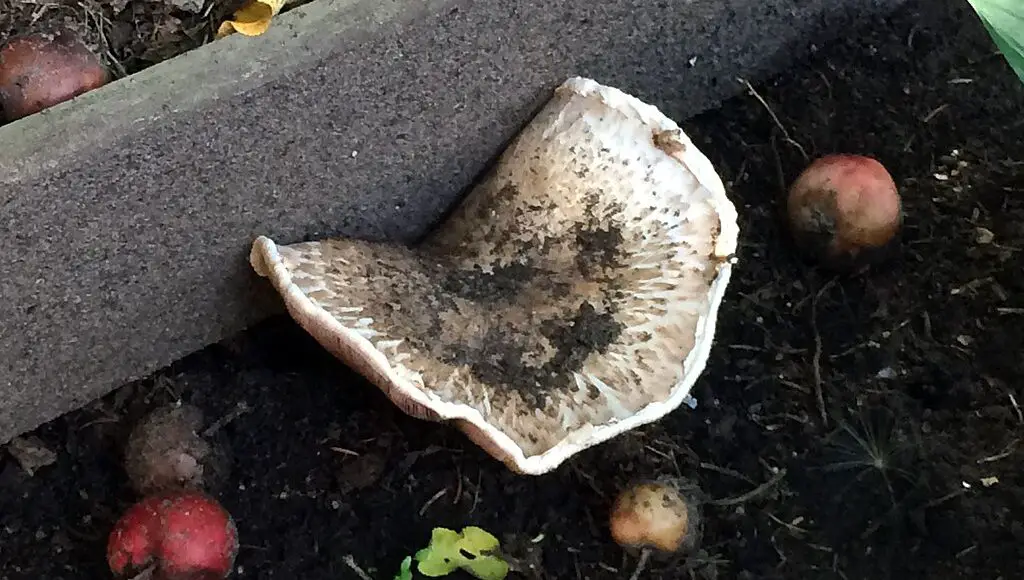You may have heard of using mushroom compost in your garden, and the problems that it can cause with burning your plants. If so, you’re probably wondering whether it’s actually safe to use mushroom compost in your garden, or whether it would be better to choose a standard compost mix or something else.
Mushroom compost can burn your plants if you use it in concentration; it is a good idea to mix it and use it sparingly in your garden to prevent this from occurring. Don’t use neat mushroom compost on acid-loving plants.
What Is Mushroom Compost?

Mushroom compost (often called “spent mushroom compost”) is compost that is leftover after mushrooms have been farmed in it. The mushroom substrate tends to be made of straw, gypsum, and manure, and not all mushroom compost has already been used for mushrooms (it depends where you buy it from).
Mushroom compost is often inexpensive because it can be made fast, sometimes in as little as two weeks, and it only uses three reasonably cheap ingredients.
This makes it viable for large-scale farming and also a good alternative if you want something cheap to grow your plants in – but you shouldn’t just go ahead and buy a bulk load because it has some problems too.
Firstly, it is quite alkaline, which means that you need to be careful about adding it to your garden if you have acid-loving plants or you haven’t tested your soil lately. If you have tested your soil and it is already quite alkaline, mushroom compost won’t make a great addition to it.
Secondly, mushroom compost can contain high amounts of sodium, and this can be very bad for your plants, especially if you use it in large quantities. Salt is extremely damaging and if you have ever poured neat salt on the ground, you’ll know just how fast it kills plants.
However, mushroom compost does have its uses in yards, so let’s look at whether it will burn your plants and when you can safely use it.
Does Mushroom Compost Burn Plants?
Mushroom compost can burn your plants, yes. If you use it and you notice that a plant’s leaves are yellowing or the plant has wilted somewhat, the chances are that it is being burnt by the salt in the compost.
You need to test your soil to determine whether mushroom compost is a suitable addition, because in many cases, it will not enrich the ground, and could cause more problems than it solves. If you don’t test first, you have no way of knowing whether the soil will be improved by the addition of mushroom compost.
You can purchase soil testing kits very easily online, and these will give you information about the soil’s temperature, moisture levels, nutrients, and pH value. Testing your soil from time to time is a great way to ensure that anything you add is helping, and to find out if you’ve added too much of one thing or another.
If you have accidentally added too much mushroom compost to a plant, you may wish to dig the plant up and transplant it into some normal compost and soil mixture. Water it well and stand it somewhere shady to recover.
How Can You Reduce The Chances Of Plant Burn?
The best way to reduce the chances of burning your plants is to use a soil testing kit so you know exactly what your soil is lacking and how to correct it. This is the only way to make the right decisions that are grounded in a proper understanding of your garden, and all your choices going forward can be based on the information you gain.
If, for example, you discover that the soil is very acidic, it may be okay to add some mushroom compost to neutralize the pH. If the sodium levels are very low, your soil will likewise be more tolerant of the addition of mushroom compost.
If, however, either of these values is high when you test the soil, you will know that mushroom compost is dangerous to add.
The second thing that you can do to reduce the chances of the compost burning your plants is to look for a low sodium one. This should be available if you look around a little.
On the whole, the high salt content is due to the way the compost is made (since gypsum and manure are high sodium), but it is possible to find mushroom compost with low sodium levels.
Where Should You Use Mushroom Compost?
It may also help to know where mushroom compost tends to be most helpful, and where you should avoid using it.
This kind of compost can be great on a vegetable garden, particularly if you are growing alkaline-loving crops such as brassicas. It can keep back certain kinds of disease and the lime in it will add to the value of the soil, making it more fertile.
However, if you are growing fruit crops or fruit trees, mushroom compost is not a suitable option. These plants prefer acidic conditions and will not cope well with the alkalinity in the compost. You may even kill them if you add too much.
If you’re wondering whether you can use mushroom compost to feed your lawn, the answer is that it depends. On the whole, neat mushroom compost will be too strong for your lawn and will kill the grass, but if your soil is very acidic, you may be able to use it in fairly small quantities to neutralize the pH.
What about for seedlings? Unfortunately, mushroom compost is not really suitable for starting seedlings, even if it looks lovely and rich. It does not contain the nutrients that most plants need, and its high alkaline, high salt conditions won’t give your plants a great chance of growing up strong and healthy.
Often, mushroom compost needs to be mixed with other compost to be useful in the garden, but there are cases in which you can use it “as is.” However, bear in mind that it is not rich in nutrients like traditional compost is, so it won’t feed your plants as effectively.
How Should You Use Mushroom Compost?
It’s best to use mushroom compost sparingly, for the reasons stated above. Even low sodium mushroom compost should not be used in large quantities, because it will still increase the amount of salt in the soil, and it also lacks many of the nutrients that your plants need.
If you wish to use this kind of compost in your garden, spread it out and use it on occasion, rather than all the time. Thin layers that are allowed to slowly seep into the ground will prove the safest application method, getting the goodness into the soil without sharply increasing the sodium or alkalinity.
You may find that the easiest way to use mushroom compost safely and effectively is to mix it with regular compost. Many suppliers already do this as a way of overcoming its negative properties and allowing its benefits to shine.
Doing this can also bring the costs down considerably, as the mushroom compost is often much cheaper and will help to bulk out the ordinary compost and make it go further without harming the plants. What it lacks in nutrients will be contained in your regular compost, creating a healthy overall addition to the garden.
How Can You Reduce The Salt Levels In Mushroom Compost?
If you’ve bought mushroom compost, you might be wondering whether you can reduce the salt levels in some way at home. It is possible, but it should be stressed that this is not a reliable method – it is just something you can try if you would like to, perhaps if you have already bought the compost and don’t want to waste it.
Put your compost in a large container and thoroughly water it with the hose. The water will help to wash the salt content to the bottom of the container, although this may take some time and is not a guaranteed way to remove the salt.
Once you have finished washing it, you should allow it to dry. You can either drain the container or use the compost at the top and discard the bottom part, where the salt will be particularly concentrated.
It is a good idea to test this with a soil testing kit before using it, to ensure you have been successful in reducing the salts. You may still want to mix it with regular compost for added safety to ensure that you can’t burn your plants.
Summary
Mushroom compost will rarely burn plants unless you use it in excessive quantities, but it is not a particularly valuable addition to the garden. If you wish to use it, you should choose a low sodium variety and mix it with standard compost to ensure that your plants have access to plenty of nutrients without the risk of burning.
Don’t use mushroom compost for acid-loving plants such as fruit trees or members of the ericaceous family.

